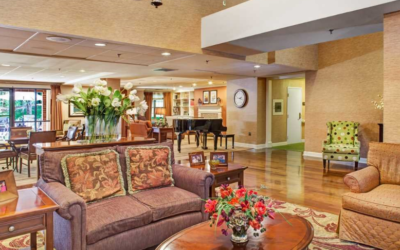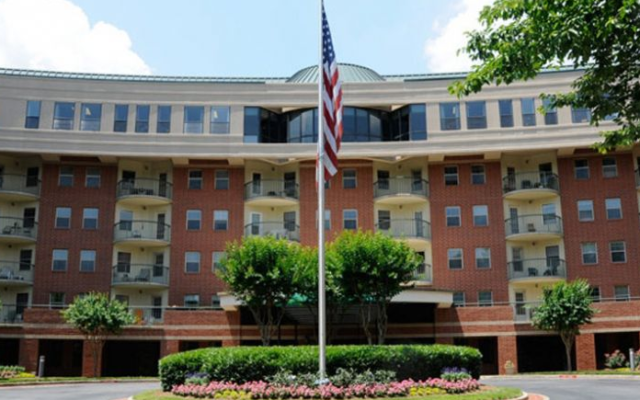COVID-19 Changes Passover, Life for Seniors
Virus Alters Life at Huntcliff Summit in Sandy Springs.
When the first cases of the COVID-19 virus first began surfacing in the United States in February, the residents and staff of the senior independent living community of Sunrise at Huntcliff Summit in Sandy Springs showed little outward concern.
The dining room and the cocktail lounge were crowded at dinnertime, family and friends of the residents were free to come and go and a full calendar of daily activities kept the residents busy.
Two months later, everything has changed. The bar and dining room are empty, family and friends are barred from visiting and each of the 220 residents is forbidden to leave their apartment without permission. Meals are delivered to each resident and the afternoon happy hour comes from a beverage cart that’s pushed through the halls.
Huntcliff Summit’s Passover Seder, which last year attracted 125 guests, has been cancelled. Instead, each of the facility’s Jewish residents is responsible for creating their own seder, alone, in their apartment, or they can join one online. For the residents, many of whom are in their 80s and 90s, it is a holiday like none they’ve ever seen.
Every morning a nurse stops at each apartment, and takes the resident’s temperature and asks about their general health. For some of those living here, like Ed Wexler, the short daily visit can be among the most stressful moments they experience.
“Every day when she comes, I’m like, holding my breath,” he admitted. “Is she going to say, ‘Gee Ed, you’re running a temperature today?’ Or is she going to say I’m ok? I breathe a sigh of relief when she leaves and wishes me well. I mean, I’ve made it for another day.”
The stakes are high for this segment of the population, which often has underlying health issues in addition to their age. Even when the residents could move freely around the building, several week ago a longtime friend of Wexler’s, who was tethered to a portable oxygen tank, waved him away when he came near.
“There’s a lot of fear out there because we’re the ones with the most to lose,” Wexler said.

The recent death of friends in another city, a couple in their 80s, weighs heavily on him. They were wealthy, influential and well-liked. Only a few weeks before they had visited their children in New York and then flew home. Both of them contracted the virus and both died within a week of one another.
His good friend Dr. Morris Miehl, a retired anesthesiologist who has lived in this independent living facility for almost 20 years is also concerned, but somewhat more philosophical.
“Living here these days,” he says, “is like living in a golden cocoon. The opportunity in this cocoon is to discover new things. In these four walls I am living in, I am busy all the time.”
He mentions that while he’s not a whiz on the internet, his son, who’s a successful high-tech entrepreneur, has given him a few pointers.
“I get about 20 different emails about Jewish life every day,” he said. “I watch the services from Central Synagogue in New York City. The first night of Passover I am going to participate in an online seder. I think a lot of people, when they are in a place like this, they vegetate. Not me.”
But being active during this time doesn’t mean that Miehl doesn’t take his health seriously. While we were talking, he received a package from Amazon.
“Amazon’s got a big problem with the virus,” he said knowingly. “I’ve got some gloves here and I have a mask, from when I took care of my wife before she passed away. So I’m going to put on the gloves on and unwrap it.”
Miehl, who has experienced a lot in his long medical career, is shaken by what he has seen so far.
“It’s not an influenza epidemic. It’s not a polio epidemic. It’s not a tuberculosis epidemic. We’ve had them all. This particular virus that is afflicting so many people all over the world is going to change the world. And the world will never, ever, be the same.”




comments